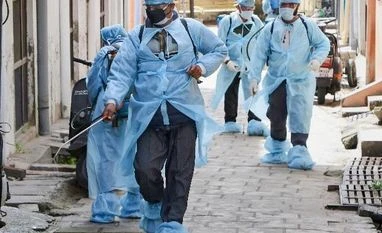Voting may not have appealed but warm spring sunshine did as people mingled in streets and parks in France on Sunday despite new government measures to curb the rapid spread of the coronavirus.
France was choosing mayors for 35,000 town halls and almost half a million councillors in an election that was overshadowed by the coronavirus outbreak and that went ahead even with the stringent steps announced the previous day.
By 1600 GMT turnout was at 38.7% nationally, down from 54.7% in local elections in 2014, confirming concerns that abstentions could eclipse the previous lowest turnout in 1971.
One voter, Pascale, 59, who gave only her first name and who was wearing a mask and gloves after voting in Paris' 7th district, said it seemed irresponsible to hold the vote.
"I've got a lot of friends and family that will not go even if they usually carry out their civic duty," she said.
On Saturday, Prime Minister Edouard Philippe ordered the shutdown of most shops, restaurants and entertainment facilities and urged people to stay at home except for essential shopping, light exercise. The measures were announced after cases of the illness in France doubled in 72 hours.
People appeared to ignore the warnings when it came to their social life.
In the gardens of he Louvre Museum and along the banks of the River Seine in the capital, hundreds of people mingled, picnicked and drank in the spring sunshine.
Marseille's old port was packed with people determined to enjoy the warm temperatures.
"We're worried like everybody, but it's sunny. We're not close to people and we're not touching them," said writer Marc Roger,62.
Authorities said on Saturday that 91 people had died of the virus and more than 4,500 were infected, including 300 who were in intensive care.
President Emmanuel Macron called on people on Sunday to act responsibly and adhere to the measures, saying the government had been forced to toughen its steps because people were being too lax in how they protected themselves from the virus.
In Spain and Italy, the governments have imposed a strict nationwide lockdown controlled by security forces. Philippe's office declined to comment on whether France was heading towards taking similar steps.
NOT SCARED
In polling stations across the country, people were visibly cautious, trying with difficulty to keep a safe distance from each other.
Poll clerks wore latex gloves, offered disinfectant and marked out lanes with arrows on the floor showing where people should stand while waiting for their turn. Some voters wore gloves and brought their own pens to sign off their vote.
"I am going to vote and keep living my life no matter what.
I am not scared of the virus, said one voter, a 60-year-old woman who asked to be identified only as Martine as she entered a polling station in Paris' 16th district.
The election comes at a time of growing public scepticism in France about traditional politics.
Hours before polling stations opened, major opposition politicians including the conservative heads of six regions criticised the government for not calling off the vote.
Macron supporters accused the opposition of changing tack for political reasons.
"Forty-eight hours ago, the same ones did everything they could to stop the vote from being postponed," MEP Stephane Sejourne, Macron's former political adviser, said.
Macron decided to go ahead with the elections last week, saying it was vital that the democratic system keep functioning.
Philippe suggested on Saturday the election's second round on March 22 could be pushed back. If the second round does not go ahead, the first round is likely to be annuled.
"I find the government position hypocritical. Keeping the local election going is pure nonsense," Laurence Koch, 38, who works at a city planning consulting firm, said.
The elections are an important test for Macron after a wave of protests over the last year, first from the "yellow vests" movement and now from opponents of his plans to reform the French pensions system. His party is not expected to do well.
Unlock 30+ premium stories daily hand-picked by our editors, across devices on browser and app.
Pick your 5 favourite companies, get a daily email with all news updates on them.
Full access to our intuitive epaper - clip, save, share articles from any device; newspaper archives from 2006.
Preferential invites to Business Standard events.
Curated newsletters on markets, personal finance, policy & politics, start-ups, technology, and more.
)